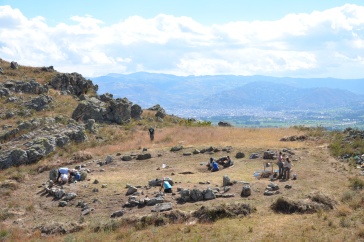
The great love of Peter Horne’s life was his wife Holly (Patterson) ’60, whom he met at UNH. On the day he died, Nov. 7, 2016, he wrote her a final love note, a fitting tribute to their 52 years of marriage.
At UNH Peter joined the Air Force ROTC and after graduation served as a lieutenant in the Air Force, seeing six years of active duty. An officer in the Strategic Air Command, his service included an assignment at Thule Air Force Base in Greenland.
After leaving the military, Peter began a career in government and higher education. The Hornes lived in Rye while Peter worked as a consultant to the New England Center at UNH and studied for a doctorate in education at Boston University. Peter and Holly later moved to Freeport, Maine, with their two children, Christian ’91 and Eric. Peter became a Cooperative Extension agent with the University of Maine and earned his doctorate in 1980. Four years later he became director of UNH Cooperative Extension and dean of the university’s College of Life Sciences and Agriculture, where he served until his 1999 retirement.
Music was an important part of Peter’s life. In a tribute they prepared at the time of his death, Peter’s sons noted that their father “believed in the power of music to bring people together, to help them celebrate, to help them mourn, to help them pray.” Music helped Peter keep a positive attitude no matter what curves life threw at him, including being shipwrecked off the coast of Nicaragua in 1964 and, since 1975, battling the cancer that ultimately took his life.
“He was a wonderful person inside and out. When he died, we lost a good one.”
Peter felt a great sense of responsibility to the communities in which he lived. In Rye, his love of the ocean and sailing spurred him to help form, and later chair, Concerned Citizens of Rye (CCR), a group that helped thwart Olympic Oil’s attempt to establish an oil refinery on the New Hampshire seacoast in the 1970s. In Freeport, he served on the boards of the Thomas Means Club, a social and charitable group that grants scholarships and donations to local students and organizations; Wolfe’s Neck Farm, a 625-acre saltwater farm that shares its tradition of sustainable agriculture with the public; and the Harraseeket Yacht Club.
Near the end of his life, Peter collaborated with author Lisa Moll ’17G on her book Rye’s Battle of the Century—Saving the New Hampshire Seacoast from Olympic Oil. Moll recalls that when she started researching the book, everyone told her she needed to talk with Peter Horne, and “he could not have been more gracious.” The duo quickly discovered that they shared an interest in ensuring that current and future generations understood and remembered the dramatic changes that could have happened to the New Hampshire seacoast if a group of concerned citizens had not stepped up to take on Greek billionaire Aristotle Onassis and his oil company.
Peter had been the perfect person to chair CCR, says Moll, thanks to his ability to break down complex ideas so that anyone could understand them. And, she says, “he was the definition of tenacious.” If she mentioned something he could help her with, his answer was always, “I’m on it,” and he’d send a flood of emails encouraging other former CCR members to share their memories with her.
“He was a wonderful person inside and out,” says Moll. “When he died, we lost a good one.”
Originally published in UNH Magazine Fall 2017 Issue
















































